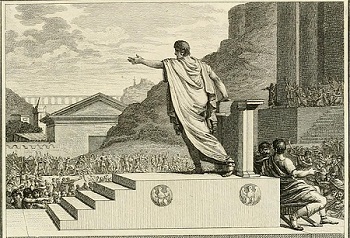providencemarianwood.org – In ancient Rome, the Tribune was a highly respected and sacrosanct official endowed with the power known as tribunicia potestas. This unique authority granted the Tribune the ability to veto actions by other magistrates and to protect the plebeians from the patrician class. The institution of the Tribune played a crucial role in the governance of Rome, reflecting the complex interplay of social classes and political powers within the Republic.
The Origins and Evolution of the Tribune
The office of the Tribune emerged in the 5th century BC as a result of the struggles between the plebeians and patricians. Initially, Tribunes were elected to represent the interests of the plebeian class and to protect them from the arbitrary actions of the patrician magistrates. Over time, the role of the Tribune evolved, and by the late Republic, it had become one of the most influential positions in Roman politics.
The Sacrosanctity of the Tribune
One of the most distinctive features of the Tribune was their sacrosanctity. This meant that any harm done to a Tribune was considered a sacrilege, punishable by death. This protection ensured that Tribunes could carry out their duties without fear of retribution from the powerful patricians.
The Powers of the Tribune
The tribunicia potestas granted the Tribune several key powers:
- Veto Power: Tribunes could veto the actions of other magistrates, including the Senate. This power was crucial in preventing legislation that favored the patricians at the expense of the plebeians.
- Legislative Initiatives: Tribunes could propose laws and call for plebiscites, which were direct votes by the plebeian assembly. This allowed them to bypass the Senate and directly influence the legislative process.
- Protection of the Plebeians: Tribunes had the authority to intervene on behalf of plebeians in legal matters and to protect them from abuses by the patrician magistrates.
The Tribune in Roman Politics
The Tribune’s role in Roman politics was both dynamic and controversial. On one hand, Tribunes were seen as champions of the people, fighting against the entrenched power of the patricians. On the other hand, ambitious individuals could use the office to advance their personal agendas, often leading to political instability.
Notable Tribunes
Several Tribunes left a lasting mark on Roman history, including:
- Tiberius Gracchus: A Tribune who attempted to reform land distribution in favor of the plebeians, leading to his violent death and a political crisis.
- Gaius Gracchus: Brother of Tiberius, he continued his brother’s reforms and expanded the powers of the Tribune, ultimately meeting a similar fate.
- Julius Caesar: Before his rise to dictatorship, Caesar held the office of Tribune, using it to build his political base and challenge the Senate.
Conclusion
The Tribune was a cornerstone of the Roman Republic, embodying the tensions and dynamics of Roman society. Through their sacrosanct tribunicia potestas, Tribunes played a critical role in shaping Roman law, politics, and the balance of power between the social classes. Their legacy is a testament to the enduring influence of this unique institution in the history of governance and democracy.
